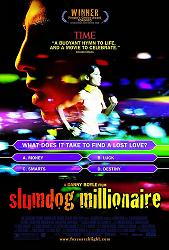India: Reactions to Slumdog Millionaire

Danny Boyle. Image by Flickr user stits and used under a creative commons license
The film was shot by a mix of British and Indian crew in Mumbai, India and released late last year in the US and Europe. Last week the film was released in India. While the film got fantastic write-ups and reviews in the US, the film has got mixed reviews in India. Unsurprisingly, the film's music track by AR Rahman has got a consistent thumbs-up in India. The reviews and feedback of Slumdog Millionarie cover a fascinating array of opinions. Perhaps, the one blog post that created a lot of buzz are the remarks of Indian superstar Amitabh Bachchan. A prolific blogger, Mr. Bachchan had this to say about the movie in one of his earlier posts:
“On blog, comments for the film ‘SlumDog Millionaire’ and the anger by some on its contents, prompt me to say the above. If SM projects India as Third World dirty under belly developing nation and causes pain and disgust among nationalists and patriots, let it be known that a murky under belly exists and thrives even in the most developed nations. Its just that the SM idea authored by an Indian and conceived and cinematically put together by a Westerner, gets creative Globe recognition. The other would perhaps not.”
Predictably, Mr. Bachchan's comments were subjected to intense scrutiny by the media and bloggers. Just Jo writes in his post You Have No Idea Sir jee that while he has not seen Slumdog Millionaire that the slums featured in the movie are a reality in Mumbai, India. He writes:
“And if you haven't noticed, Sirjee, Hollywood has time and again featured the bad and sad elements of their society in their movies. Going by your argument, after watching Hollywood movies the world should be thinking that America is a country that consists only of criminals, racists, rapists, pregnant teenagers, drug-peddlers, pedophiles etc etc. But is that the case? They used this wonderful medium of Cinema to fight against those evils, Sirjee. And you become angry when the same is done here. Oh, in the process, you were also angry at the legendary filmmaker Satyajit Ray too!”
Since that first post on Slumdog Millionaire Mr. Bachchan has written another post clarifying his statement and speaking to director Danny Boyle and Anil Kapoor, the actor.
Nandan Nilekani, co-founder and head of Infosys, India's largest IT services company has an very interesting post where he talks about how films in India are the “zeitgeist” of the generation. Nilekani draws a comparison between Indian movies of the 1970s and Slumdog Millionaire and notes the difference in the world views of the these two generations. He writes:
“The movie is at its heart, about aspiration, and about dreams coming true. This ‘common man’ Jamal, is not angry, like the Indian men of the 1970s. He is both hopeful and relentless, defiant and proud of his origins even as the people around him call him a ‘slumdog’. He knows better – that it doesn't matter where you come from, only where you are headed.”
But, what do the young Indians think about the film? Do they think it is a hopeful film about aspirations and dreams coming true? It appears that not every young Indian subscribes to the hopeful note in the film. PH of Desicritics writes that he did not find Slumdog Millionaire “engaging” and points out:
“Unlike his counterparts from the American South, Jamal never quite becomes the everyman's voice of his period in Indian history; we never hear him telling us other people's interesting stories from his vantage point as an ‘outsider’ …All this makes Slumdog a half-hearted, comme ci, comme ca endeavor that wants to both be a fairy-tale and capture urban poverty but falters on both counts.
PH concludes that:
“Slumdog, then, is at best an attempt to cook a saccharine dish in a bitter sauce.”
Meera Sinha, a young Indian American who is spending a year in India saw the film. She draws our attention to the reaction from from Mumbai slum dwellers, who have protested against the term “slumdog” to describe them. More importantly, Meera draws our attention to the debate the movie has generated and writes:
“This kind of healthy critique of popular culture will help us understand our relationship to the media and its representations of us.”
Whether people like the movie or not, the fact is that Slumdog Millionaire has started a conversation in India about poverty, entrepreneurship and Indian films. Hopefully that conversation will yield results.
Thumbnail images by Flickr users Richliu & dq, used under creative commons license.